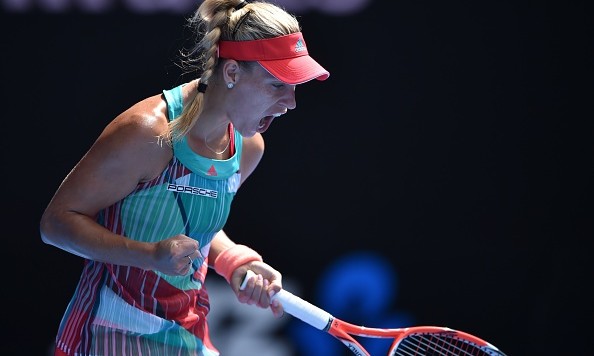It’s an oft-seen phenomena in sports, specifically in tennis.
A team or player delivers a thrilling upset, only to fall short of a title or fail to use that momentum for a substantial run. Typically, one day’s huge breakthrough is the next day’s or the next game’s deflating loss. As soon as a resurgence begins, it loses steam and ends.
In recent memory, there’s Wisconsin over Kentucky in last season’s NCAA Basketball Final Four. The Badgers still lost to Duke in the title game.
In tennis alone, consider Fernando Verdasco’s fate this very fortnight. Verdasco roared to a remarkable first-round win over Rafa Nadal, only to be buried by Dudi Sela in the next round. Ask Lukas Rosol at 2012 Wimbledon, who suffered the same fate after a first-week Slam win over Nadal.
Sometimes, the break point isn’t the most difficult part. Keeping tennis terms in use here, it’s consolidating that counts, building upon an emotionally resonant triumph and translating that to real achievement.
**
Angelique Kerber succumbed to no such letdown, a day removed from a viscerally rewarding quarterfinal “upset” of the lower-seeded Victoria Azarenka.
Kerber looked the part of a steady veteran Thursday afternoon in Melbourne, thwarting another surprise semifinalist in Britain’s Johanna Konta with a straight-set victory on the playing surface of Rod Laver Arena. It’s Kerber’s first career Grand Slam final, a rich achievement regardless of whether she can beat top-seeded Serena Williams this weekend.
Given Kerber’s track record, it was fair to wonder if she would consolidate. The German had been bounced by a lower seed in her last 13 Grand Slam appearances, making just one quarterfinal in that span. The halcyon days of 2011-2012, when she showed so much elite potential by making semifinals at Wimbledon and the U.S. Open, were long gone.
This Australian Open was a resurrection of sorts. The WTA has proven volatile enough that we shouldn’t take this to mean Kerber is ready to be a second-week staple.
Yet this tournament was fraught enough with its own mental handicaps, ones that have ruined Kerber during the past three seasons. The No. 7 seed faced a match point in her opening-round match versus Misaki Doi, all of 64th in the world. (Side note: This is the third consecutive year the Australian Open women’s final includes a player who survived a match point in the tournament’s first week. Li Na won the title in 2014, and Maria Sharapova lost in the finals last year.)
Her portion of the draw was decimated by upsets, but that only added to the pressure given her past failures against lower seeds. Then, she drew Azarenka, the two-time Australian Open champion who was in fine form and appeared to be a legitimate threat to unseat Williams.
For a player with the mental baggage of Kerber, these were legitimate obstacles. Even against Konta on Thursday, the Brit bounced back from an 0-3 deficit in the opening stanza and made Kerber serve to stay in the first set. This was prime territory for Kerber to wilt.
Instead, Kerber once again seized a tipping-point moment in the tournament. She won easy points on her serve, ground out a break in the ensuing game, and closed out the set with aplomb. It wasn’t just a pendulum point in the match, but arguably her entire career. At age 28, Kerber needed to own this moment, or it might never be so readily available again.
Once she took set one, Kerber had demoralized Konta, who undoubtedly helped the German by not applying second-set pressure. The Brit committed 16 unforced errors in the final set.
Kerber still had to be steady enough to take advantage. After redlining winners like she did for large swaths of her win against Azarenka, this was not a given. Kerber produced only 14 winners but committed just 11 “UFEs.” This was a savvy move, shifting the pressure to make shots on her less-experienced foe.
Kerber’s ability to pair these matches, barely 24 hours apart, is notable. The German proved to herself that she can elevate her game against an establishment contender and then win a mental test.
That’s valuable far beyond her impending finals meeting with Serena, who will and should be the overwhelming favorite despite Kerber dropping a mere set so far Down Under.
Kerber’s season and subsequent career will be defined less by her showing Saturday, and far more by the resolve she needed to emerge from a volatile half of the draw this week.
In other words, let’s break this out to the grand scale. Making the finals now constitutes the break point. There’s reason to believe Kerber can be a contender at Grand Slam events again, consolidation still required.

